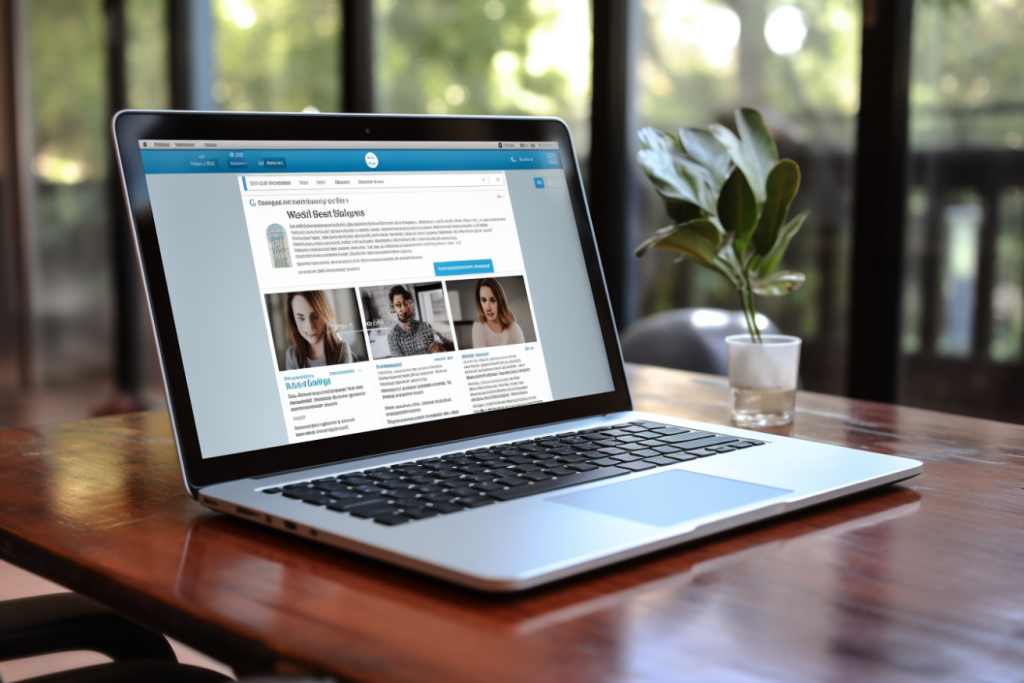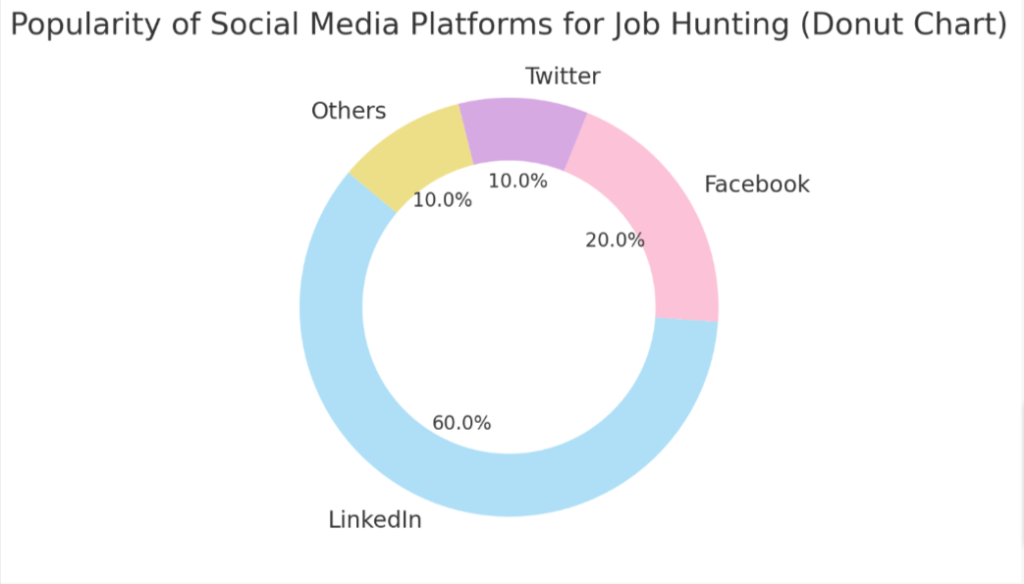Mastering Social Media Platforms: Your Gateway to Job Opportunities
1. Introduction
In today’s digital age, the boundaries between our personal and professional lives have become increasingly blurred, thanks in no small part to the rise of social media. While platforms like Facebook, Instagram, and Twitter once primarily served as spaces for personal connections and sharing, they have rapidly evolved into tools that wield immense power in the professional realm.
For job seekers, social media offers a unique opportunity to cast a wider net, connect with potential employers, and showcase their skills in innovative ways.
Recent statistics highlight the growing importance of social media in the recruitment process. According to a survey conducted by the Society for Human Resource Management, 84% of organizations are now using social media for recruitment, while 9% plan to use it in the future.
The reasons are manifold: these platforms allow employers to tap into a broader talent pool, while also providing insights into a candidate’s fit with the company culture.
But what does this mean for the modern job seeker? Simply put, a well-curated social media presence has become just as crucial as a polished resume. When used strategically, these platforms can open doors to opportunities that might have otherwise remained out of reach. However, the key lies in understanding how to harness the vast potential of social media for job hunting effectively.
In this comprehensive guide, we’ll delve into the ins and outs of using social media to boost your job search. From preparing your profiles to networking and application tips, we’ve got you covered. Whether you’re a seasoned professional or a recent graduate, the strategies outlined here will equip you with the tools you need to navigate the digital job market with confidence.
2. Understanding the Power of Social Media in Job Hunting
Gone are the days when job hunting involved scouring newspaper classifieds or hopping from one company to another to drop off physical resumes. In the digital era, traditional methods have given way to more dynamic, online-based approaches, with social media taking center stage. But why has this shift occurred, and what makes social media such a formidable tool for job seekers?
Firstly, let’s consider the vast reach of these platforms. With billions of users worldwide, social media provides an unparalleled opportunity for exposure. For job seekers, this means that your profile, posts, and interactions can potentially be seen by a global audience, including recruiters and hiring managers from companies you might not have even considered.
Additionally, the very nature of social media promotes networking, a critical aspect of the modern job market. Platforms like LinkedIn are specifically designed to facilitate professional connections, but even more general platforms like Twitter or Facebook can be used to build and maintain a professional network.
By following industry leaders, engaging in discussions, and sharing relevant content, you can position yourself as an active, informed participant in your field.
Moreover, the speed at which information spreads on social media is unmatched. Job openings, company announcements, and industry news can be shared and amplified in real-time, allowing job seekers to stay updated and respond promptly. This immediacy can be especially beneficial when it comes to highly sought-after positions that might be filled quickly.
However, it’s not just about speed and reach. Social media also offers a more holistic view of companies and their cultures. By following and engaging with a company’s social media profiles, you can gain insights into their values, work environment, and even the kind of projects they handle. This information can be invaluable when deciding where to apply and how to tailor your application.
In essence, social media has transformed job hunting from a one-dimensional, reactive process to a multi-faceted, proactive endeavor. By understanding and leveraging the unique advantages these platforms offer, job seekers can not only find opportunities more efficiently but also position themselves more effectively in the competitive job market.
3. Preparing Your Profiles for the Job Search
Before diving headfirst into the job hunting process on social media, it’s imperative to ensure that your profiles are in top-notch condition. Think of your online presence as your digital resume – it should reflect your professional aspirations, highlight your skills, and give potential employers a sense of who you are both in and out of the workplace.
The Concept of Personal Branding
What is personal branding and why is it essential?
Personal branding is the practice of marketing oneself and one’s career as brands. It’s about defining and expressing your unique value proposition – the combination of skills, experiences, and personality traits that set you apart. In the age of social media, where information is abundant and attention spans are short, having a strong personal brand can be the difference between blending in and standing out.
How to create a consistent online image across platforms
Consistency is key. From your profile pictures to your bios, ensuring a consistent image across different platforms makes you easily recognizable and reinforces your brand identity. Use similar headshots, maintain a uniform tone in your descriptions, and ensure your details (like job titles or educational background) are consistent.
Optimizing your LinkedIn Profile
Using a professional photo
Your LinkedIn photo should be a clear, high-quality headshot that portrays you in a professional light. Avoid casual or party photos. Remember, this is often the first impression you’ll make on a potential employer.
Crafting an impactful headline and summary
Your headline should succinctly capture your professional essence. Instead of just mentioning your current job title, consider highlighting your expertise or unique value. The summary, on the other hand, offers a space to delve deeper, showcasing your career achievements, goals, and personal passion projects.
Highlighting relevant skills and endorsements
List the skills that are most relevant to the kind of jobs you’re targeting. Encourage colleagues and peers to endorse these skills, as this adds a layer of validation to your claims.
Requesting and giving recommendations
Recommendations provide social proof of your abilities and work ethic. Request them from past colleagues, bosses, or clients, and be sure to return the favor. Genuine, detailed recommendations can significantly boost your profile’s credibility.

Cleaning up and professionalizing other social media profiles
Facebook: Adjusting privacy settings and curating content
Ensure that any personal or potentially controversial content is set to ‘private.’ Regularly review and update your privacy settings, and be mindful of the content you share, ensuring it aligns with the image you wish to portray professionally.
Twitter: Building a professional narrative while staying authentic
While it’s essential to remain professional, Twitter also allows for a touch of personality. Share industry news, engage in relevant discussions, but also let your authentic self shine through occasionally. Remember, potential employers appreciate genuineness.
Instagram: Mixing personal and professional, using stories for job aspirations
Instagram can be a blend of personal moments and professional milestones. Use stories to share behind-the-scenes glimpses of conferences, workshops, or any relevant professional endeavors. This not only showcases your commitment to your field but also provides a more rounded view of you as an individual.
In summary, your social media profiles should be a harmonious blend of professionalism and personality. By ensuring they’re optimized and consistent, you’re setting the stage for a successful job hunting journey on these platforms.
Researching Potential Employers and Opportunities
The beauty of social media lies not just in its ability to help you showcase your skills, but also in the vast amount of information it makes accessible at your fingertips. Researching potential employers and understanding industry trends has never been easier. Here’s how to maximize these platforms for your research:
Leveraging LinkedIn for Company Research
Following target companies:
Begin by following the LinkedIn pages of companies you’re interested in. This will ensure you receive updates on job postings, company news, and other relevant announcements. It’s a straightforward way to keep tabs on potential opportunities.
Engaging with company updates and posts:
Engage with the content these companies post, whether it’s liking, sharing, or commenting. This not only keeps you informed but can also get you noticed by the company’s hiring managers or HR team.
Using the “Jobs” feature:
LinkedIn’s “Jobs” tab is a treasure trove of opportunities. Regularly check this section, and don’t forget to set up job alerts for specific roles or companies to receive instant notifications.
Utilizing Twitter for Industry News and Networking
Following industry leaders and influencers:
Identify and follow thought leaders, industry analysts, and influencers in your field. Their insights, shares, and discussions can provide a valuable understanding of the current industry landscape and emerging trends.
Participating in relevant hashtags and Twitter chats:
Many industries have specific hashtags or organized Twitter chats where professionals discuss topical issues. Participating in these can enhance your understanding and also position you as an engaged member of your professional community.
Exploring Niche Social Platforms for Specific Industries
Behance and Dribbble for designers:
If you’re in the design field, platforms like Behance and Dribbble are essential. They not only allow you to showcase your portfolio but also to explore and engage with the work of other designers, and even spot job opportunities posted by companies.
GitHub for developers:
For tech professionals, especially developers, GitHub is a goldmine. Beyond hosting and reviewing code, you can also explore company repositories to understand their tech stack and challenges, and occasionally find job postings.
In conclusion, social media platforms are rich sources of information that can give you an edge in your job hunt. By actively researching and engaging, you not only stay informed but also increase your chances of finding opportunities that align perfectly with your career goals and aspirations.
5. Networking: Building and Leveraging Connections
Networking has always been at the heart of a successful job search. In the digital age, this principle remains unchanged, but the methods and platforms have evolved. With social media, networking has expanded beyond the confines of physical events or personal introductions, offering endless opportunities to connect, engage, and collaborate.

The Importance of Networking in the Digital Age
The adage “It’s not what you know, but who you know” holds weight even today. Networking can lead to referrals, introductions to hiring managers, or insights into unadvertised job openings. In the digital realm, networking allows you to tap into a global pool of professionals, offering a broader perspective and more opportunities.
Engaging in Relevant Groups and Communities
LinkedIn groups related to your field:
There are numerous LinkedIn groups dedicated to specific industries, job roles, or skills. Joining and actively participating in these groups can help you build connections, share knowledge, and learn from industry peers.
Facebook groups for job seekers and industry-specific networks:
Similar to LinkedIn, Facebook boasts countless groups where professionals share job openings, discuss industry trends, and offer advice. Engaging in these groups can enhance your network and open doors to potential opportunities.
Engaging with Content: Commenting, Sharing, and Creating
Engagement is the currency of social media. Regularly comment on posts that resonate with you, share content that adds value to your network, and create your own content to establish thought leadership. This not only boosts your visibility but also positions you as a proactive and knowledgeable professional.
Direct Outreach: Crafting Messages to Potential Employers or Referrals
While it’s crucial to build and nurture your network, sometimes a direct approach can yield results. If you come across professionals or hiring managers from companies you’re interested in, don’t hesitate to reach out. However, ensure your message is personalized, clear, and respectful. Express genuine interest in their work or company and articulate how you could potentially add value.
Attending Virtual Conferences and Webinars
The rise of virtual events has made it easier for professionals worldwide to attend conferences, workshops, and webinars. These events often come with networking components, allowing attendees to connect and interact. Participate actively, ask questions, and follow up with fellow attendees or speakers who caught your attention.
In essence, networking on social media is about forging genuine connections and cultivating relationships. It’s a two-way street where giving (in the form of insights, help, or engagement) can often lead to receiving (in the form of opportunities, referrals, or advice). Remember, the goal is to build a robust, authentic network that can support and propel your career forward.
6. Social Media Job Application Tips
Harnessing social media for job hunting doesn’t stop at research and networking. When it comes to the actual application process, these platforms offer unique avenues and strategies that can set you apart. Here’s how to optimize your job applications on social media:
Finding Job Postings on Social Media Platforms
Using platform-specific search features:
Platforms like LinkedIn, Twitter, and even Facebook have robust search functionalities. Use relevant keywords, job titles, or company names to discover job postings. For instance, a search for “#JobOpening Graphic Designer” on Twitter can yield real-time results.
Following recruitment agencies and job boards:
Many recruitment agencies and job boards have active social media presences. By following them, you can stay updated on the latest job postings in your field.
Crafting a Social Media-Specific Cover Letter or Introduction
Given the informal nature of some social platforms, a traditional cover letter might not always fit. Instead, craft a concise, compelling introduction that captures your enthusiasm for the role, your key qualifications, and your familiarity with the company. Remember, the goal is to grab attention and prompt the reader to explore your profile or resume further.
Using Multimedia: Videos, Infographics, and Portfolios
Social media platforms are inherently visual, allowing for a richer representation of your skills and experiences. Consider creating:
- Videos: A short video resume or introduction can make a memorable impression.
- Infographics: Showcase your achievements, skills, or career trajectory visually.
- Portfolios: Platforms like Behance or LinkedIn allow you to attach work samples or portfolios directly to your profile or application.
Ensuring Quick Response Times and Keeping Track of Applications
Social media job hunting can be fast-paced. Ensure you respond promptly to any messages or inquiries. Additionally, keep a record of where you’ve applied, the job details, and any interactions. This not only helps you stay organized but also ensures timely follow-ups.

Staying Updated with Company Announcements
If you’ve applied to a company, it’s beneficial to keep an eye on their social media for any announcements or updates. Not only does this keep you informed, but it can also provide talking points if you’re called for an interview.
In conclusion, applying for jobs via social media requires a blend of traditional job application principles and platform-specific nuances. By understanding and leveraging these unique dynamics, you can enhance your chances of catching the eye of potential employers and landing that dream job.
7. Avoiding Common Social Media Job Hunting Mistakes
While social media offers vast opportunities for job seekers, it also comes with potential pitfalls. Navigating the digital landscape requires awareness and strategy to avoid common mistakes that could harm your job prospects. Here’s a rundown of these missteps and how to steer clear of them:
Over- or Under-Sharing: Finding the Right Balance
It’s essential to strike a balance in your online sharing. While being overly secretive can render you invisible in the digital job market, oversharing can come off as unprofessional or even careless. Aim for a middle ground where you share relevant professional updates, engage with industry discussions, but also maintain boundaries.
Being Inconsistent with Your Personal Brand
Jumping from one professional identity to another can confuse potential employers. Ensure consistency in how you present yourself across platforms, in terms of both visuals and content. Your personal brand should reflect your genuine professional aspirations and expertise.
Engaging in Controversial or Unprofessional Online Behavior
While everyone is entitled to their opinions, airing controversial views without discretion can be off-putting to potential employers. Stay away from heated arguments, refrain from posting inappropriate content, and always be respectful in your online interactions.
Ignoring the Importance of Networking
Merely setting up professional profiles isn’t enough. Active networking, whether by joining groups, attending virtual events, or engaging with industry content, is crucial. Remember, many job opportunities come through referrals or personal connections.
Neglecting to Research Potential Employers
Just as employers research candidates, you should be researching potential employers. Blindly applying to companies without understanding their values, culture, or even the specifics of the job role can lead to mismatched expectations.
Overlooking Profile Details and Updates
An outdated profile can give the impression of disinterest or stagnation. Regularly update your accomplishments, skills, and experiences. Also, periodically review your profile details for accuracy.
Not Utilizing Platform-Specific Features
Each social media platform offers unique features beneficial for job hunting. For instance, not using LinkedIn’s job alert feature or ignoring Twitter’s hashtag searches can mean missed opportunities. Familiarize yourself with the capabilities of each platform and use them to your advantage.
In essence, while social media offers a dynamic space for job hunting, it’s essential to approach it with strategy and professionalism. Avoiding these common mistakes can enhance your online image, making you a more attractive candidate in the eyes of potential employers.
8. Monitoring Your Online Reputation
In the digital age, your online reputation can play a pivotal role in your job prospects. What’s available about you on the internet can influence an employer’s decision to hire you or even consider your application. Hence, it’s crucial to actively monitor and manage your online presence.
Setting up Google Alerts for Your Name
One of the easiest ways to keep tabs on your online mentions is by setting up Google Alerts for your name. This free service sends you email notifications whenever your name appears in new online content. It’s a straightforward way to stay updated on what’s being said about you or any content you might have missed.
Periodically Reviewing Your Privacy Settings
Social media platforms often update their terms of service and privacy settings. Regularly review and adjust these settings to ensure that your private information remains private. This is particularly important for platforms like Facebook, where personal and professional lines might blur.

Addressing Negative Content and Feedback Proactively
If you come across negative mentions or feedback about you online, address them promptly and professionally. If it’s a misunderstanding, clarify it. If it’s valid criticism, acknowledge it and express your intent to improve. Being proactive and mature about negative feedback can actually enhance your reputation.
Seeking Testimonials and Positive Endorsements
Positive reviews, testimonials, or endorsements can significantly bolster your online reputation. On platforms like LinkedIn, encourage colleagues, superiors, or clients to leave recommendations. These act as validations of your skills and work ethic, providing a boost to your profile.
Regularly Googling Yourself
Every few months, conduct a simple Google search of your name. This gives you a clear picture of what potential employers might see when they look you up. If there’s any content that doesn’t align with your professional image, work on having it removed or push positive content to overshadow it.
Keeping Personal and Professional Content Distinct
While it’s okay to showcase personality on professional platforms, or vice versa, always be mindful of the content’s nature. A good rule of thumb is to avoid posting anything you wouldn’t want a potential employer to see, irrespective of the platform.
In conclusion, in an era where digital footprints can have lasting impacts, monitoring and managing your online reputation is not just advisable—it’s imperative. By taking proactive steps and being mindful of your online interactions, you can ensure that your digital persona complements and enhances your real-world professional aspirations.
9. The Future of Job Hunting on Social Media
As with all digital landscapes, the realm of social media is ever-evolving. What’s effective today might be obsolete tomorrow, and new platforms or features can emerge that revolutionize the job hunting process. While we’ve discussed current best practices, it’s also essential to look ahead and anticipate the future of job hunting on social media.
The Rise of New Platforms and Tools
While platforms like LinkedIn, Twitter, and Facebook currently dominate the professional networking space, the digital world is always ripe for innovation. New platforms or specialized tools may emerge, catering specifically to job hunters or certain industries. Staying adaptable and open to these new avenues can give job seekers an early adopter advantage.

The Importance of Adaptability and Continuous Learning
One of the most consistent traits of the digital age is change. As algorithms evolve and user behaviors shift, the strategies that once worked might lose their effectiveness. Continuous learning and adaptability will be crucial for job seekers. This might mean upskilling, staying updated with industry news, or simply being open to new ways of networking and job hunting.
Predictions on the Evolving Role of Social Media in Recruitment
- Increased Use of AI and Machine Learning: Recruitment processes on social media might leverage AI more intensively to match candidates with suitable roles based on their profiles, activities, and endorsements.
- Virtual Reality (VR) and Augmented Reality (AR) in Job Interviews: As technology advances, platforms might incorporate VR or AR to facilitate immersive job interviews or offer virtual office tours.
- Greater Emphasis on Soft Skills: With the wealth of personal and professional information available, employers might use social media to assess a candidate’s soft skills, like communication, adaptability, or teamwork, by analyzing their interactions and posts.
- Rise of Personalized Job Recommendations: Just as e-commerce platforms suggest products based on browsing habits, social media platforms might offer job recommendations tailored to a user’s activities, interests, and skills.
In essence, while the core principles of professionalism, networking, and authenticity will likely remain, the tools and methods of job hunting on social media are poised to evolve. Forward-thinking job seekers will not only adapt to these changes but will also anticipate and leverage them to stand out in an increasingly competitive digital job market.
10. Conclusion
Navigating the digital realm of job hunting can initially seem daunting. With the myriad of platforms, tools, and strategies available, it’s easy to feel overwhelmed. However, as we’ve explored in this comprehensive guide, the key to success lies in harnessing the unique capabilities of each platform, building genuine connections, and consistently presenting a professional and authentic image.
The rise of social media in the professional world is undeniable. Its power to connect job seekers with potential employers, bridge geographical barriers, and provide real-time insights into industries makes it an invaluable tool in the modern job search arsenal. Yet, it’s crucial to remember that while technology provides the avenue, human connections remain at the heart of successful job hunting. It’s the relationships you nurture, the value you offer, and the authenticity you bring that will truly set you apart.
As the landscape of social media continues to evolve, so will its role in job hunting. Staying updated, being adaptable, and maintaining a learner’s mindset will be essential. With the strategies and insights shared in this guide, you’re now equipped to embark on a successful social media job hunting journey, leveraging the digital space to unlock exciting career opportunities.
To all job seekers out there: The digital world is vast, filled with potential and opportunities. Embrace it, engage with it, and let it propel your career to new heights. Here’s to your success in the digital job market!
11. Additional Resources
In the ever-evolving landscape of social media job hunting, continuous learning and staying updated are paramount. To further aid you in your journey, we’ve curated a list of recommended resources, tutorials, and directories that can provide added value, insights, and tools to enhance your job search.
Recommended Reading
- “Crush It!: Why NOW Is the Time to Cash In on Your Passion” by Gary Vaynerchuk – A deep dive into the power of the internet for personal branding and professional success.
- “LinkedIn Unlocked: Unlock the Mystery of LinkedIn” by Melonie Dodaro – A comprehensive guide to harnessing LinkedIn for networking and job hunting.
- “Job Searching with Social Media For Dummies” by Joshua Waldman – A beginner-friendly guide to leveraging various social media platforms for job search.
Tutorials on Optimizing Social Media Profiles for Job Hunting
- LinkedIn Learning: Offers a range of courses on personal branding, LinkedIn optimization, and networking strategies.
- Hootsuite Academy: Provides tutorials on building an online presence and mastering social media platforms for professionals.
- Udemy: Features numerous courses on social media strategy, personal branding, and effective job hunting techniques.
Directories of Niche Job Boards and Communities
- Behance Job List: A dedicated space for designers to discover job opportunities and showcase their portfolios.
- GitHub Jobs: A job board for tech professionals, especially developers, offering listings from renowned tech companies.
- Mediabistro: A platform for media professionals, offering job listings, career advice, and courses.
Additional Tools
- Canva: A user-friendly design tool that can help in creating resumes, infographics, or visual content for your social media profiles.
- Grammarly: An online grammar checker to ensure your profiles, applications, and posts are error-free.
- Buffer: A social media management tool that can help schedule posts, track your social media engagement, and analyze results.
In conclusion, the journey of job hunting on social media is one of continuous growth, learning, and adaptation. The resources listed above are designed to complement the strategies discussed in this guide, offering deeper insights and hands-on tools. As you navigate this digital realm, remember that every interaction, post, and connection is a step closer to your next career milestone. Best of luck, and happy job hunting!

